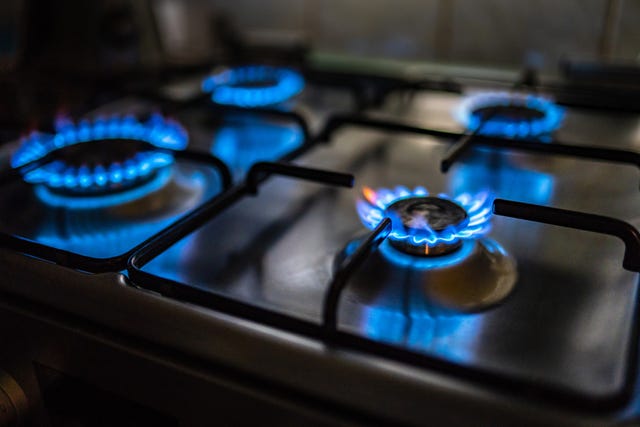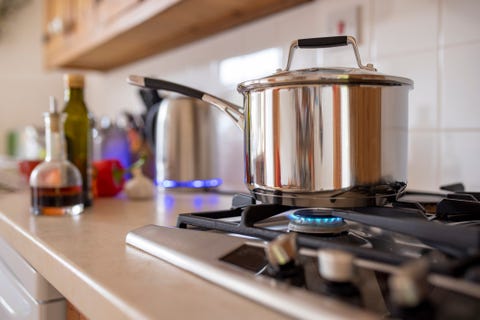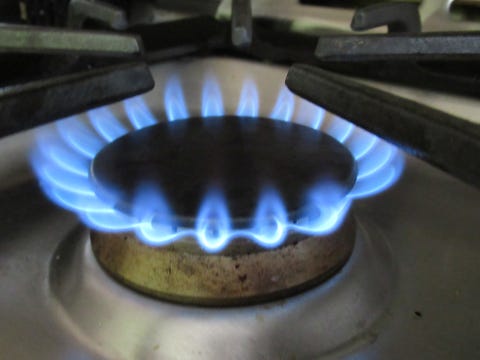For basically forever, gas stoves have been the
preferred cooking appliance of professional chefs and at-home gourmets
alike. They offer far greater temperature control compared to their
electric counterparts, and there’s just something special about cooking
over a live flame vs a glowing red coil. But lately, gas stoves have
come under fire … uh, figuratively.
The hoopla began earlier this month when Consumer
Product Safety Commission (CPSC) Commissioner Richard L. Trumka Jr. told
Bloomberg that his agency was considering a ban on gas stoves
in the US. The reason for a potential ban, Trumka cited, was related to
health risks posed by natural gas stoves, as numerous studies have
shown that the fumes they emit cause significant health risks. These
risks potentially include cancer and respiratory illness, but the
strongest evidence links their use to childhood asthma. (A recently-published study from the peer-reviewed International Journal of Environmental Research and Public Health found that nearly 13% of childhood asthma in the US was caused by gas stoves.)
Trumka’s quote set off an absolute firestorm of
panic about gas stoves. Much of that panic came from the right-wing
media machine, which seemed more than happy to open up yet another battlefield
in their ongoing culture wars as red meat to feed to their base (cooked
on a gas stove, naturally). With deluded fears of federal agents
breaking down their doors and dragging out their gas stoves, many people
began to see the gas stove as a symbol of freedom against government
overreach. But let’s take a deep breath (away from the gas stove,
please) and look at what’s actually going on with your gas stove.
No one is coming to take your gas stove
Even if gas stoves do end up being banned in the
US, that doesn’t mean you’ll have to give up the stove that’s already in
your kitchen. “We are not looking to go into anyone’s homes and take
away items that are already there. We don’t do that,” Trumka told CNN
in an interview. Any potential ban would only apply to new products,
and not the 40% of US households that already have a gas stove, as the
commissioner went on to explain. “If and when we get to regulation on
the topic, it’s always forward-looking. You know, it applies to new
products. Consumers always have the choice of what to keep in their
homes and we want to make sure they do that with full information.”
The president opposes a gas stove ban
Even if you don’t own a gas stove currently but are
hoping to buy one in the future, you shouldn’t anticipate any federal
ban going into effect as long as President Biden is in office. The 46th
US President is against banning gas stoves, according to White House spokesman Michael Kikukawa, who was quoted in the New York Times
as saying, “The President does not support banning gas stoves. And the
Consumer Product Safety Commission, which is independent, is not banning
gas stoves.”
However, even without federal intervention, gas stoves will likely be harder to come by in new buildings in the future, as a number of cities
(and a few states) have already enacted or are looking into bans that
would prohibit natural gas lines from being built into new construction,
effectively banning gas stoves along with gas furnaces and water
heaters.
Photography by Keith Getter (all rights reserved)Getty Images
What to do if you have a gas stove
Given the dangers associated with gas stoves, you
may want to consider swapping yours out if you have one. While the
government won’t be forcing you to do so, it will incentivize you to
exchange your stove for an electric one. The Inflation Reduction Act,
signed into law by the Biden Administration last year, allows for rebates of up to $840
for the purchase of a new electric stove and up to an additional $500
for the cost of converting your setup from a gas one to an electric one.
If you do insist on cooking with gas, or if your
situation doesn’t allow you to pursue other options, there are some
safety measures you should consider. Proper ventilation
can greatly reduce the risks associated with gas stoves, so always be
sure to open the windows in your kitchen (or those closest to your
kitchen) and turn on your range hood if you have one to mitigate the negative effects of gas cooking.








 As long as electronic voting machines are used your VOTE really doesn’t count AND you no longer have a country. Another excellent reason to return to paper ballots and hand counting. - ED]
As long as electronic voting machines are used your VOTE really doesn’t count AND you no longer have a country. Another excellent reason to return to paper ballots and hand counting. - ED]